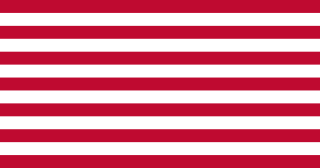
The Continental Navy was the navy of the Thirteen Colonies during the American Revolutionary War. Founded on October 13, 1775, the fleet developed into a relatively substantial force throughout the Revolutionary War, owing partially to the substantial efforts of the Continental Navy's patrons within the Continental Congress. These Congressional Patrons included the likes of John Adams, who served as the Chairman of the Naval Committee until 1776, when Commodore Esek Hopkins received instruction from the Continental Congress to assume command of the force.
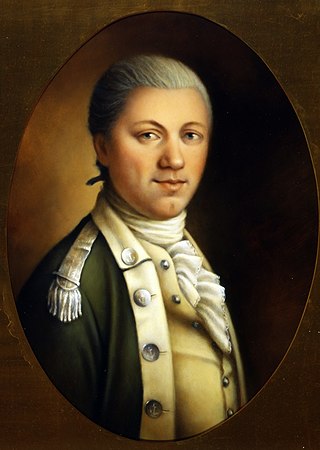
Samuel Nicholas was an American marine and military officer who was the first officer commissioned in the United States Continental Marines and by tradition is considered to be the first Commandant of the Marine Corps.

Captain Silas Talbot was an American military officer and slave trader. He served in the Continental Army and Continental Navy during the American Revolutionary War, and is most famous for commanding USS Constitution from 1799 to 1801. Talbot was a member of the Society of the Cincinnati's branch in New York.
The first USS Hornet was a merchant sloop chartered from Captain William Stone in December 1775 to serve under Stone as a unit of Esek Hopkins' Fleet. The voyage would be the first military action for master's mate Joshua Barney. The vessel was damaged while sailing with the fleet and returned to base. Hornet patrolled Delaware Bay until being captured on 27 April 1777 by the Royal Navy. Hornet was taken to Jamaica, where the ship was found to be leaking and was condemned.
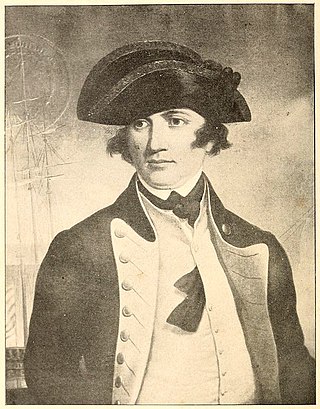
Esek Hopkins was an American naval officer, merchant captain, and privateer. Achieving the rank of Commodore, Hopkins was the only Commander-in-Chief of the Continental Navy during the American Revolutionary War. The Continental Congress commissioned him as Commander-in-Chief of the Navy in December 1775.
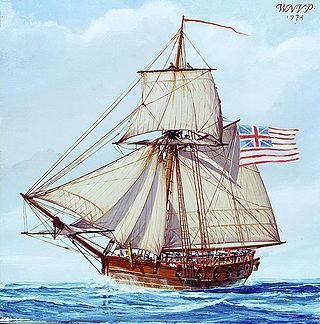
USS Providence was a sloop-of-war in the Continental Navy, originally chartered by the Rhode Island General Assembly as Katy. The ship took part in a number of campaigns during the first half of the American Revolutionary War before being destroyed by her own crew in 1779 to prevent her falling into the hands of the British after the failed Penobscot Expedition.
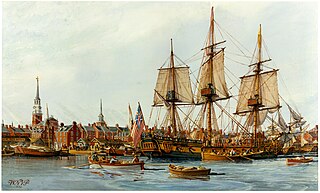
Alfred was the merchant vessel Black Prince, named for Prince Edward, Duke of Cornwall and launched in 1774. The Continental Navy acquired her in 1775, renaming her Alfred after 9th century English monarch Alfred of Wessex, and commissioned her as a 24-gun frigate. During the American Revolutionary War, the Alfred participated in two major naval operations; the battles of Nassau and Block Island. The Royal Navy captured her in 1778, took her into service as HMS Alfred, and sold her in 1782. She then became the merchantman Alfred, and sailed between London and Jamaica.

Andrew Doria was a brig purchased by the Continental Congress in November 1775. She is most famous for her participation in the Battle of Nassau—the first amphibious engagement by the Continental Navy and the Continental Marines—and for being the first United States vessel to receive a salute from a foreign power.

Nicholas Biddle was one of the first five captains of the Continental Navy, which was raised by the Continental Congress during the American Revolutionary War. Biddle was born in Philadelphia in 1750. He began sailing at the age of 13 and joined the Royal Navy when he was 20. In 1773, he sailed the Arctic with Constantine Phipps and Horatio Nelson. When the Revolutionary War began in 1775, Biddle joined the Continental Navy and commanded several ships. In 1778 off the coast of Barbados, Biddle confronted HMS Yarmouth, a 64-gun British warship. After a twenty-minute battle, Biddle's ship Randolph suddenly exploded, killing him and most of his men. Four ships of the U.S. Navy have been named in his honor.
Dudley Saltonstall (1738–1796) was an American naval commander during the American Revolutionary War. He is best known as the commander of the naval forces of the 1779 Penobscot Expedition, which ended in complete disaster, with all ships lost. Norton (2003) argues the Penobscot Expedition was a total failure due to poor planning, inadequate training, and timid leadership on the part of Saltonstall.

The Pennsylvania Navy served as the naval force of Pennsylvania during the American Revolution and afterward, until the formation of the United States Navy. The navy's vessels served almost exclusively on the Delaware River, and were active in first defending the approaches to the city of Philadelphia during the British campaign that successfully occupied the city in 1777, and then preventing the Royal Navy from resupplying the occupying army.
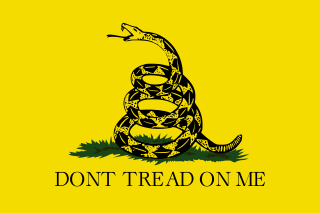
The Continental Marines were the amphibious infantry of the American Colonies during the American Revolutionary War. The Corps was formed by the Continental Congress on November 10, 1775, and was disbanded in 1783. Their mission was multi-purpose, but their most important duty was to serve as onboard security forces, protecting the captain of a ship and his officers. During naval engagements, in addition to manning the cannons along with the crew of the ship, Marine sharpshooters were stationed in the fighting tops of a ship's masts specifically to shoot the opponent's officers, naval gunners, and helmsmen.

The Raid of Nassau was a naval operation and amphibious assault by American forces against the British port of Nassau, Bahamas, during the American Revolutionary War. The raid, designed to resolve the issue of gunpowder shortages, resulted in the seizure of two forts and large quantities of military supplies before the raiders drew back to New England, where they fought an unsuccessful engagement with a British frigate.
USS Warren was one of the 13 frigates authorized by the Continental Congress on 13 December 1775. With half her main armament being 18-pounders, Warren was more heavily armed than a typical 32-gun frigate of the period. She was named for Joseph Warren on 6 June 1776. Warren was burned to prevent capture in the ill-fated Penobscot Expedition in 1779.

American colonial marines were various naval infantry units which served during the Revolutionary War on the Patriot side. After the conflict broke out in 1775, nine of the rebelling Thirteen Colonies established state navies to carry out naval operations. Accordingly, several marine units were raised to serve as an infantry component aboard the ships of these navies. The marines, along with the navies they served in, were intended initially as a stopgap measure to provide the Patriots with naval capabilities before the Continental Navy reached a significant level of strength. After its establishment, state navies, and the marines serving in them, participated in several operations alongside the Continental Navy and its marines.

The Battle of Block Island was a naval skirmish which took place in the waters off Rhode Island during the American Revolutionary War. The Continental Navy under the command of Commodore Esek Hopkins was returning from a successful raid on Nassau when it encountered HMS Glasgow, a Royal Navy dispatch boat.

The Rhode Island State Navy was the first colonial or state navy established after the American Revolutionary War began in April 1775 with the Battles of Lexington and Concord. On the following June 15, the General Assembly authorized the acquisition of two ships for the purpose of defending the colony's trade. The state's ships were generally used for defensive operations within Narragansett Bay, although some prizes were taken. The state was also one of the first to authorize privateering.
Richard Marven was a Revolutionary War naval officer who, along with Samuel Shaw, were instrumental figures in the passage of the first whistleblower protection law in the United States. The Continental Congress was moved to act after an incident in 1777, when Marven, a third lieutenant in the Continental Navy, and Shaw, a midshipman, were part of a group of sailors and marines who blew the whistle on Commodore Esek Hopkins, the commander-in-chief of the Continental Navy. The group accused Hopkins of torturing British prisoners of war. Marven and Shaw were from Rhode Island, as was Hopkins, whose brother was governor of the new state and had been a signatory to the Declaration of Independence. After being dismissed from the Continental Navy, Commodore Hopkins filed a criminal libel suit against Marven and Shaw in the Rhode Island courts.
Samuel Shaw was a Revolutionary War naval officer who, along with Richard Marven, were the first whistleblowers of the infant United States. As a whistleblower, Shaw was instrumental in the Continental Congress' passage of the first whistleblower protection law in the United States. Shaw, a midshipman, and Marven, a third lieutenant in the Continental Navy, were moved to act after witnessing the torture of British prisoners of war by Commodore Esek Hopkins, then Commander-in-Chief of the Continental Navy. Shaw and Marven were both from Rhode Island, as was Hopkins, whose brother was Stephen Hopkins, Governor of the new state, and a signatory to the Declaration of Independence. For reporting the misconduct of the Navy's highest officer, Shaw and Marven were both dismissed from the Navy. Hopkins then filed a criminal libel suit against Shaw and Marven in the Rhode Island Courts.
National Whistleblower Appreciation Day is an annual recognition of whistleblowers whose actions have protected the American people from fraud or malfeasance.











